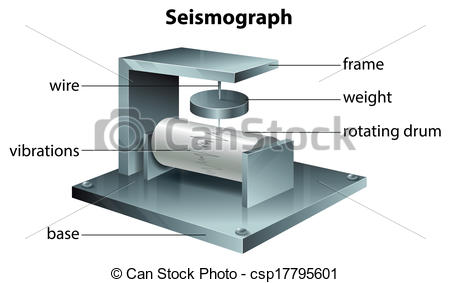
noun
- any of various instruments for measuring and recording the vibrations of earthquakes.
noun
- an instrument that registers and records the features of earthquakes. A seismogram (ˈsaɪzməˌɡræm) is the record from such an instrumentAlso called: seismometer
n.“instrument for measuring the motions of an earthquake,” 1858, from seismo- + -graph. Based on Italian sismografo, coined and invented by Luigi Palmieri (1807-1896), director of meteorological observation on Mount Vesuvius. Related: Seismographic; seismography (1865).
- An instrument that detects and records vibrations and movements in the Earth, especially during an earthquake. Most seismographs employ a pendulum mounted within a rigid framework and connected to a mechanical, optical, or electromagnetic recording device. When the Earth vibrates or shakes, inertia keeps the pendulum steady with respect to the movements of the frame, producing a graphic record of the duration and intensity of the Earth’s movements. Separate instruments are needed to record the north-south horizontal, east-west horizontal, and vertical components of a tremor. By comparing the records produced by seismographs located in three or more locations across the Earth, the location and strength of an earthquake can be determined.
 Liberal Dictionary English Dictionary
Liberal Dictionary English Dictionary